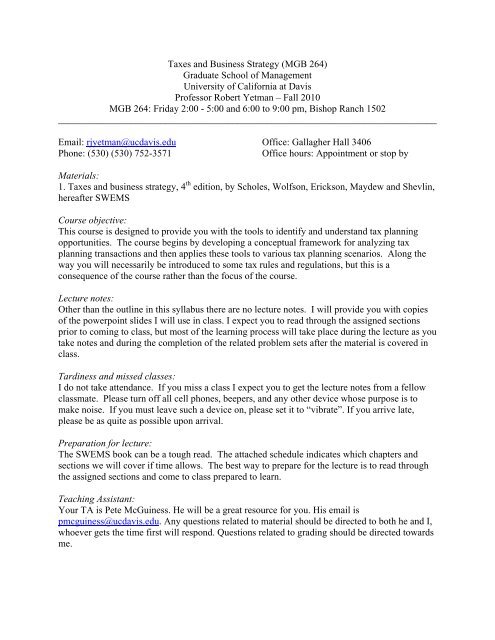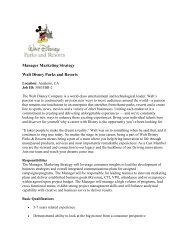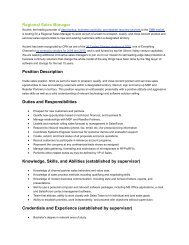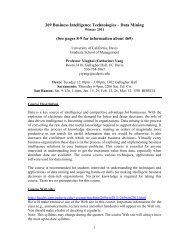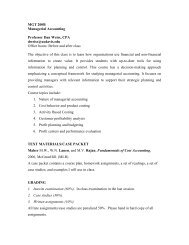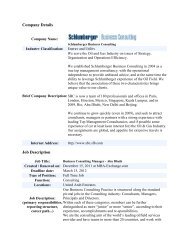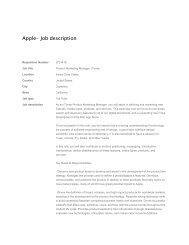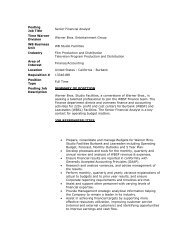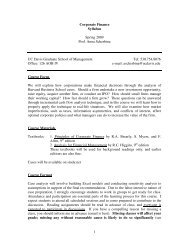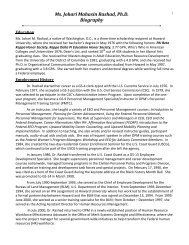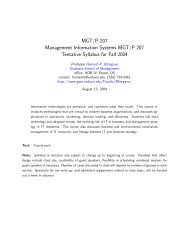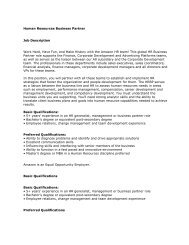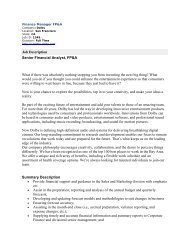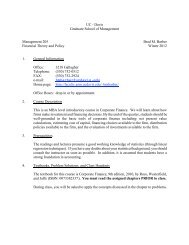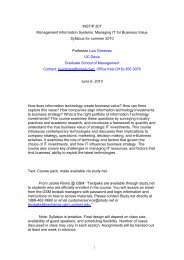Taxes and Business Strategy (MGB 264) Graduate ... - Students
Taxes and Business Strategy (MGB 264) Graduate ... - Students
Taxes and Business Strategy (MGB 264) Graduate ... - Students
- No tags were found...
Create successful ePaper yourself
Turn your PDF publications into a flip-book with our unique Google optimized e-Paper software.
<strong>Taxes</strong> <strong>and</strong> <strong>Business</strong> <strong>Strategy</strong> (<strong>MGB</strong> <strong>264</strong>)<strong>Graduate</strong> School of ManagementUniversity of California at DavisProfessor Robert Yetman – Fall 2010<strong>MGB</strong> <strong>264</strong>: Friday 2:00 - 5:00 <strong>and</strong> 6:00 to 9:00 pm, Bishop Ranch 1502______________________________________________________________________________Email: rjyetman@ucdavis.edu Office: Gallagher Hall 3406Phone: (530) (530) 752-3571Office hours: Appointment or stop byMaterials:1. <strong>Taxes</strong> <strong>and</strong> business strategy, 4 th edition, by Scholes, Wolfson, Erickson, Maydew <strong>and</strong> Shevlin,hereafter SWEMSCourse objective:This course is designed to provide you with the tools to identify <strong>and</strong> underst<strong>and</strong> tax planningopportunities. The course begins by developing a conceptual framework for analyzing taxplanning transactions <strong>and</strong> then applies these tools to various tax planning scenarios. Along theway you will necessarily be introduced to some tax rules <strong>and</strong> regulations, but this is aconsequence of the course rather than the focus of the course.Lecture notes:Other than the outline in this syllabus there are no lecture notes. I will provide you with copiesof the powerpoint slides I will use in class. I expect you to read through the assigned sectionsprior to coming to class, but most of the learning process will take place during the lecture as youtake notes <strong>and</strong> during the completion of the related problem sets after the material is covered inclass.Tardiness <strong>and</strong> missed classes:I do not take attendance. If you miss a class I expect you to get the lecture notes from a fellowclassmate. Please turn off all cell phones, beepers, <strong>and</strong> any other device whose purpose is tomake noise. If you must leave such a device on, please set it to “vibrate”. If you arrive late,please be as quite as possible upon arrival.Preparation for lecture:The SWEMS book can be a tough read. The attached schedule indicates which chapters <strong>and</strong>sections we will cover if time allows. The best way to prepare for the lecture is to read throughthe assigned sections <strong>and</strong> come to class prepared to learn.Teaching Assistant:Your TA is Pete McGuiness. He will be a great resource for you. His email ispmcguiness@ucdavis.edu. Any questions related to material should be directed to both he <strong>and</strong> I,whoever gets the time first will respond. Questions related to grading should be directed towardsme.
Exams:There will be one exam. The exam is in class, closed book, closed notes <strong>and</strong> will be taken at theend of the third class <strong>and</strong> will last 60 mins. The exam will cover the tax planning framework thatis covered in the first two weeks of the class. The format of the exam will be short answer/shortproblem. There is no make up for this exam. If you will miss the third class for any reason youmust tell me within the first week of class so we can make other arraignments.Grading:It is only natural that from time to time you might have some questions about your quizzes orexam <strong>and</strong> how they were graded. To make the process tractable, all questions are to be put in anemail with the specifics of your question, <strong>and</strong> sent to me <strong>and</strong> Pete. I will not address quiz orexam questions outside of this mechanism (i.e., during breaks).Quizzes:There will be six (6) quizzes starting with the fourth class. The quizzes are closed book <strong>and</strong>closed notes <strong>and</strong> will be given during the last 30 or 40 minutes of the class. The quizzes willcover the material covered in class <strong>and</strong>/or in the notes (but not the cases) in the previous classes.The format of the quizzes will be short answer/short problem. Quizzes will be graded <strong>and</strong>returned to you on the following class. We will count the highest 4 quiz grades, <strong>and</strong> drop yourlowest two. Quizzes not taken receive a score of zero. There are no make up quizzes, missedquizzes can count towards the two you can drop.Case presentations:There will be 10 case presentations. You will be required to take part in presenting one case (butyou are responsible for knowing the material in all the cases for your quizzes). The cases willhighlight a tax planning strategy that your group will attempt to “sell” to the class. You must beprepared to respond to questions from me. Your grade will be based on how technicallycomplete <strong>and</strong> correct your presentation is (50%), <strong>and</strong> how in-depth your presentation is (50%).Everyone in the group gets the same grade, this is a team effort. You will have only 20 minutesto present your case, so you need to be well polished <strong>and</strong> efficient with your time. You may useany presentation method you wish, but at a minimum you should have presentation slidesprepared. I will provide the presenting group with most of the answers to the case two weeksprior to the case presentation, but as with all real life cases, a full <strong>and</strong> complete set of “correct”answers does not exist. Every member of a group must present some portion of the case, nobyst<strong>and</strong>ers.Grading:Exam: 27%4 quizzes, 12 points each : 48%Case presentation: 25%There are no provisions for extra credit in the class


